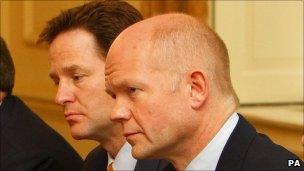Clegg clarifies stance after saying Iraq war 'illegal'
- Published

Nick Clegg and William Hague have different views on the legality of the Iraq war
Deputy Prime Minister Nick Clegg has had to clarify the government's position on the Iraq war after telling MPs the conflict had been "illegal".
At prime minister's questions, Mr Clegg said Labour's Jack Straw would have to account for his role in the "disastrous" decision to invade.
Mr Clegg later stressed his opinion was a "long-held" personal one.
Foreign Secretary William Hague, who backed the war, said his history on the issue was "different" to Mr Clegg.
As regards the government's official position on the legal basis for war, a spokesman for the deputy prime minister said "it awaits the outcome" of the Chilcot inquiry looking into the background to the war.
'Well-known view'
"The deputy prime minister was expressing his long-held view about the legality of the Iraq conflict," he added.
"His views on the matter are very well known and widely documented."
The Conservatives backed the then Labour government's decision to commit troops to Iraq in 2003, with current key figures such as Mr Hague, Prime Minister David Cameron and Chancellor George Osborne all supporting the war.
The Lib Dems, led at the time by Charles Kennedy, opposed the war and have consistently questioned its legality.
Lord Goldsmith, attorney general in the run-up to the war, has said he advised ministers that it was lawful on the basis of Iraq's failure to comply with existing UN resolutions on disarmament dating back to 1991.
In his first appearance at prime minister's questions, Mr Clegg told Mr Straw - himself filling in for acting Labour leader Harriet Harman - that he was happy to "account for everything we are doing in this coalition government".
He added: "Maybe he one day - perhaps we will have to wait for his memoirs - could account for his role in the most disastrous decision of all, which is the illegal invasion of Iraq."
As foreign secretary in the run-up to the war, Mr Straw was a crucial figure in backing the conflict and he told the Iraq war inquiry earlier this year that the UK could not have committed troops without his support.
Inquiry focus
Mr Hague, who was not in the shadow cabinet in 2003 but voted in favour of the war, distanced himself from Mr Clegg's comment later on Wednesday during a statement in Parliament on Afghanistan.
"The deputy prime minister has a different history from mine on that subject," he said in answer to a question from Labour MP David Hanson.
"That is certainly true."
It was up to ministers who were in power at the time "to account for their actions", he added. Mr Clegg was not an MP at the time of the war.
The Chilcot inquiry is continuing to examine the background to the UK's participation in the 2003 conflict and its aftermath.
However, it is not clear whether the inquiry, whose remit is to "establish, as accurately as possible, what happened and to identify the lessons that can be learned", will draw specific conclusions on the legal basis for the invasion.
Several witnesses, including former minister Clare Short, have taken issue with the war's legality.
- Published20 July 2010